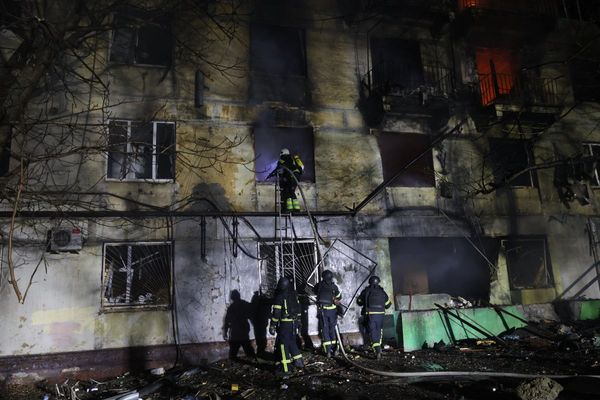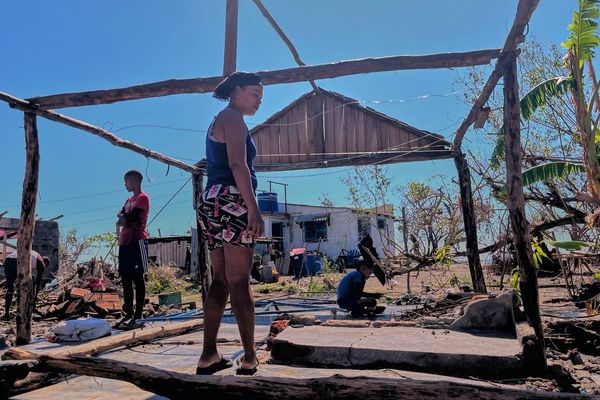
The European Commission president, Ursula von der Leyen, has warned against “the unilateral carving up of a sovereign European nation”, as Europe scrambles to assert influence over a US effort to end the war in Ukraine.
Speaking to European lawmakers in Strasbourg on Wednesday, von der Leyen said Russia showed “no signs of true willingness to end the conflict” and continued to operate in a mindset unchanged since the days of Yalta – the much-criticised and misunderstood 1945 summit to settle the post-war order.
“So we need to be clear that there cannot be unilateral carving up of a sovereign European nation, and that borders cannot be changed by force. If today we legitimise and formalise the undermining of borders, we open the doors for more wars tomorrow, and we cannot let this happen.”
She welcomed Donald Trump’s efforts to find peace, describing them as “a starting point”, but made clear that Europe had many concerns about the details outlined in the original 28-point US-Russian plan. Some of the maximalist Russia-friendly demands have since been removed, Ukraine has said, and the US president has rowed back on his Thursday deadline tied to the US holiday of Thanksgiving, amid little sign of progress on key sticking points.
Describing the situation as volatile and dangerous, von der Leyen also said she saw “an opportunity here to make real progress”, while adding that “so far we have seen no signs from Russia of true willingness to end this conflict. So we have to keep up the pressure on Russia.”
EU foreign ministers were holding a hastily arranged video conference on the situation on Wednesday.
As well as opposition to changing borders by force, von der Leyen said there should be no limits on Ukraine’s armed forces – such a restriction would “leave the country vulnerable to future attacks”. Ukraine also needed “robust, credible and long-term security guarantees”, she added.
She was speaking after a leaked recording to Bloomberg showed that Donald Trump’s special envoy Steve Witkoff told a senior Kremlin official last month that achieving peace in Ukraine would require Russia gaining control of Donetsk and potentially a separate territorial exchange. The original 28-point plan called on Ukraine to cede the entire Donetsk region to Russia, including areas under Ukrainian control.
The Kremlin spokesperson, Dmitry Peskov, said on Wednesday that it was premature to speak about striking a peace deal in the near future on Ukraine, Reuters reported.
Von der Leyen also promised the European Commission would present a draft legal proposal on using Russia’s frozen assets to fund Ukraine in 2026 and 2027. EU leaders failed to endorse the idea last month, because of legal doubts from Belgium, which hosts about €183bn of assets, most of Russia’s sovereign wealth in the EU and two-thirds of the worldwide total.
Trump’s proposal for the US to take 50% profits on a US-led venture to “rebuild and invest in Ukraine” based on $100bn from the Russian frozen assets, is adding to pressure on European leaders to resolve the issue. The US also wants Europe to contribute $100bn to the reconstruction investment fund.
Von der Leyen reiterated her support for the frozen assets plan – an EU loan to Ukraine secured on the assets and the idea that Russia would pay reparations to Kyiv – saying: “I cannot see any scenario in which the European taxpayers alone will pay the bill.”
EU leaders will discuss the frozen assets question next month as they seek to nail down a 2026-27 funding deal for Kyiv, which is expected to run out of money from next spring.
Von der Leyen said another European priority was the return of Ukrainian children forcibly deported to Russia. Von der Leyen, who is due to host an international conference on the issue in 2026, said: “There are tens of thousands of boys and girls whose fate is unknown, trapped in Russia by Russia. We will not forget them.”
Ukraine’s government has identified nearly 20,000 children who have been unlawfully deported or forcibly transferred to Russia since the start of the full-scale invasion in 2022. A Ukrainian organisation working on the issue, Bring Kids Back, has said 1,835 children have returned from deportation, forced transfers and occupied Ukraine.
The Russian president, Vladimir Putin, is wanted for war crimes by the international criminal court over the abductions. The original 28-point plan proposed a full amnesty for the actions of all parties involved in the conflict.







